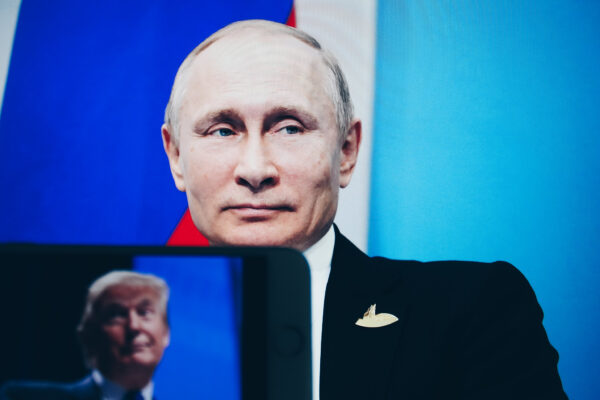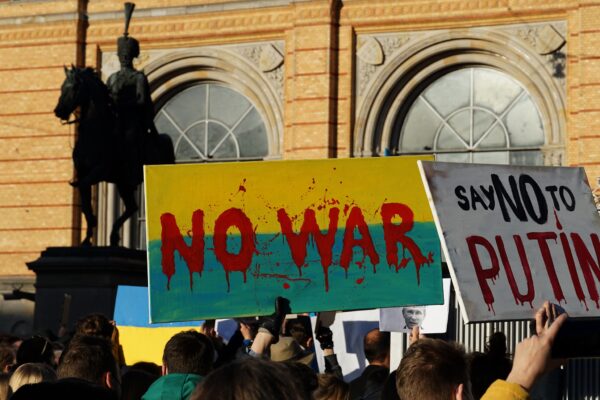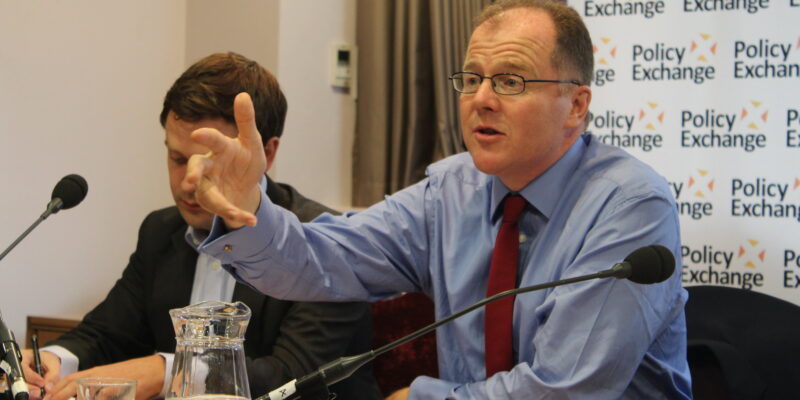Don’t forget that Putin supported Brexit
In the first of a two part article on how the Russian invasion is changing Europe, Luke Cooper considers the consequences of Putinism for the global authoritarian drift.

The Ukraine-Russia crisis poses a problem for the political leadership of the Brexit project. They cannot answer very basic questions: how does Brexit inform the UK’s response to the current crisis? In what ways does it help? And what strategic conclusions for how the UK should relate to Ukraine and Russia follow from the Brexit ‘vision’?
These problems were evident in the recent speech given by Foreign Secretary Liz Truss to the Atlantic Council. There may have been a hint of the Global Britain narrative in her appeal to “develop stronger alliances around the world”, but the speech was, for the most part, measured and respectful, free of the usual bitterness and sniping towards the EU that has often dominated. While she urged “pragmatism” over the Northern Ireland Protocol, there were no eurosceptic tirades. Yet, this also gave the impression that Brexiters had little to say on the current crisis.
The uncomfortable truth, of course, is that Vladimir Putin supported Brexit. It is a matter of public record that the Russian ambassador hosted Aaron Banks, the sponsor of Leave.EU and associate of Nigel Farage, for what Banks described as a “six-hour boozy lunch”. Carole Cadwalladr and Peter Jukes uncovered evidence of “multiple meetings” and contacts between Banks, the Leave.EU campaign and various Russian businessman and officialdom.
There was also an open, publicly expressed affinity. Putin urged Theresa May to “fulfil will of people” and deliver Brexit. Russian state media platforms RT and Sputnik cheered on the whole agenda – and Putin has provided far-reaching support to the European radical right, actively seeking to build a populist bloc against the ‘Brussels elite’.
At home, Putin’s war has used extreme ethnonationalist discourses to garner legitimacy. Having for years provided informal patronage to fascists like Aleksandr Dugin, Putin overtime came to adopt similar frameworks and ideas himself. Not only has the Russian state thrown itself into generating the kind of geopolitical turmoil that the far right see as helpful to their goals, but Putin called the very legitimacy of Ukraine’s independent existence as a national people into question and has used brutal military force to achieve these chauvinist and imperialist goals.
Putin and the global rise of authoritarian protectionism
In my book, I’ve discussed the global rise of anti-democratic politics through the concept of authoritarian protectionism. This politics seeks to secure the interests of ‘the people’ (usually defined in ethnonationalist terms) from a range of other groups that allegedly threaten their identity and interests, e.g., ‘cosmopolitan’ elites, minority groups and migrants. Attacks on democracy and the rule of law are justified by the these so-called threats – and this, in turn, cultivates corruption and crony capitalism as checks and balances decline, sometimes rapidly.
Globally, there is a spectrum, stretching from the more radical to the moderate examples of these trends. But all of these ingredients have been present in the Brexit process and UK government policy. The shameful failure to welcome Ukrainian refugees over the last weeks is entirely consistent with the Conservatives’ wider agenda – seen, above all, in the Nationality and Borders Bill which they are still committed to pushing through the UK parliament.
Post-Brexit British foreign policy has followed Nato in remaining very cautious of Russia and Putin. This reflects how there has never been a clearcut authoritarian alliance of states. International allegiances of all shades tend to sit uneasily with a politics that prioritises the protection of national interests over the general or ‘universal’, as Trump’s chaotic shifts and about turns on foreign affairs illustrated. But the extreme nature of Putin’s actions – with his full-scale military invasion of a sovereign state – has further disrupted what was already a complicated picture.
Many of his erstwhile sympathisers like Viktor Orbán in Hungary have felt compelled to oppose him. Even the Vučić regime in Serbia, a traditional ally of Russia, voted with the majority at the United Nations after having allegedly been told that their hopes of becoming an EU candidate were at stake if they supported Putin’s war.

If Brexit is so good, why does no one want to imitate it?
This case of Serbian realignment away from Russia shows how poorly Brexit addresses the needs of the current moment. Rather than foreshadowing the breakup of the EU, Britain’s exit has had the opposite effect. Serbia and other Western Balkans countries continue to form an orderly line of countries hoping to join the bloc. Once radical Eurosceptics are also resigned to remaining in the EU. In France, Emmanuel Macron’s closest challengers in the race for the presidency, Jean-Luc Mélenchon on the far left, and Marine Le Pen and Éric Zemmour on the far right, all rail against the EU but do not actually seek a “Frexit”, restricting their pledges to reforms and renegotiations.
Changes in EU policy (to be discussed in Part 2) are also inauspicious for Brexit Britain. The Russian invasion and the economic counter-war from the West has given some substance to the long talked about idea of a ‘geopolitical Europe’. For all the government’s platitudes about ‘renew[ing] the architecture of international cooperation for the 21st century’, the reality remains that the EU is in a self-assertive mood and has a far greater capacity to leverage power in the international system than the UK does. A sensible British policy would try to keep close to, and influence, the EU, recognising its outsized impact on world affairs, as well as our geographical proximity and close historic ties.
Watching the consequences of their own authoritarian nationalism play out in Ukraine is uncomfortable for many Brexiters. Even Nigel Farage, a man who previously said he “admired” Putin, admitted “I was wrong. Putin has gone much further than I thought he would.” It has also thrown the American far right onto the defensive, as figures who had spent months defending Putin now change tack. But, ultimately, for many on the radical right, the war is seen as part of the turmoil besetting the world’s civilisations, which justifies their authoritarian protectionist agenda.
Putin’s victory in the war would certainly embolden this complex global authoritarian alliance. Equally, however, all those supporting Ukraine’s heroic resistance must be pressured to recommit, in substance not just rhetoric, to human rights, the rule of law, a free media, international cooperation and the integrity of the democratic process.
Part 2 – The dangerous allure of “Europe first”, will be published on Wednesday 16th March.
***
Luke Cooper is a Senior Research Fellow at IDEAS, the foreign policy think tank of the London School of Economics. His book, Authoritarian Contagion; the Global Threat to Democracy (Bristol University Press), is out now.
March 13, 2022
Brexit Spotlight is run by Another Europe Is Possible. You can support this work by joining us today. The website is a resource to encourage debate and discussion. Published opinions do not necessarily represent those of Another Europe.





